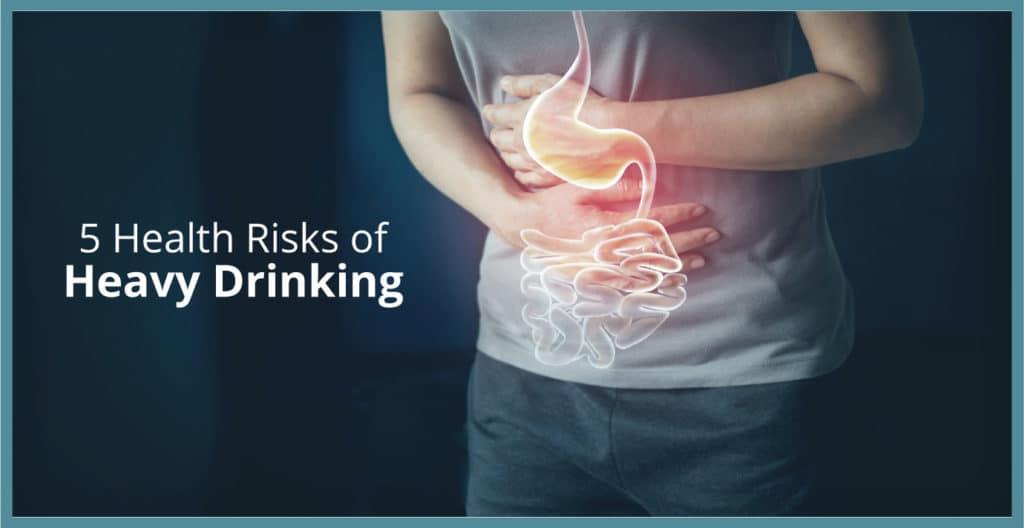Excessive drinking is a far-reaching problem that includes a number of health risks. Take a look at five health risks associated with heavy drinking:
1. Alcoholic Liver Disease
When someone consumes alcohol, the liver is the main organ that metabolizes it. This puts the liver at high risk for damage. Many people who suffer from chronic, heavy drinking also suffer from alcoholic liver disease. First, excessive drinking changes the way the liver metabolizes fats. This allows excess fat to accumulate in the liver, causing a condition called alcoholic fatty liver disease. This is reversible if caught early. Alcohol use also causes alcoholic hepatitis, which is inflammation of the liver. This inflammation can cause scar tissue to develop. If this is left untreated, the scar tissue can turn hard and lead to cirrhosis of the liver, a potentially fatal disease.
2. Cancer
Many types of cancer are linked with excessive alcohol consumption, including:
- liver cancer
- stomach cancer
- esophageal cancer
- larynx cancer
- mouth cancer
- colo-rectal cancer
- breast cancer
[inline_cta_one] Alcohol and acetaldehyde in alcoholic drinks are responsible for this increased risk.
3. Digestive System Problems
Heavy drinking can disrupt the digestive system, causing problems with acid reflux, stomach ulcers, and gastritis, which is painful inflammation of the stomach lining. Alcohol interferes with the normal production of stomach acid and can delay the stomach or bowels from emptying. Ulcers from alcohol consumption, when paired with the effects of chronic liver disease, are quite dangerous and may cause internal bleeding.
4. Damage To The Brain
Alcohol has a near-immediate impact on the brain, causing blurred vision and problems with memory. It slows reaction time and limits an individual’s normal reflexes. These typical signs of intoxication occur because alcohol interferes with neurotransmitters and receptors in the brain. In other words, drinking alcohol affects the brain’s underlying chemistry. Alcohol also depresses the central nervous system. Although intoxication is a short-term condition, repeated exposure to alcohol can create long-term damage to the brain. For people under the age of 24 who still have developing brains, heavy alcohol use can stunt development. In older adults, excessive alcohol consumption speeds up the aging process in the brain, which can lead to premature problems with dementia.
5. Cardiovascular Disease And Stroke
People who drink heavily are at risk for high blood pressure because alcohol causes the body to release hormones that constrict blood vessels. Long-term use of alcohol can increase blood pressure for an extended period, leading to heart problems like angina and heart failure. Similarly, people who drink heavily have a high risk for stroke, especially after a period of binge drinking. Binge drinking causes blood pressure to fluctuate while also triggering more platelet activity, increasing the risk for stroke.
The Impact Of Drinking Varies From Person To Person
Everyone who drinks excessively is at risk for health problems, but each individual will react to alcohol differently based on their body chemistry, size, and overall health. Genetic factors and gender can also impact how much alcohol affects an individual. Even though the effects may vary, many studies have found that alcohol causes negative health outcomes, and the NIH warns it is one of the leading preventable causes of death.
Facts About Heavy Drinking
Heavy drinking has several serious consequences. Take some time to understand some important facts about alcohol use disorder:
- The CDC estimates alcohol use to be the fourth leading preventable cause of death in the United States.
- Women who drink eight or more drinks a week and men who drink 15 or more a week are considered heavy drinkers.
- One out of every six adults admits to binge drinking four times a month, and this behavior affects people ages 18 to 34 most frequently.
- Men are twice as likely to participate in binge drinking than women.
Treating Alcohol Use Disorder
Because alcohol use takes a significant toll on the body, getting help is critical to preserving your health and life. If you or someone you love is struggling with alcohol use, professional treatment, such as alcohol rehabilitation, is the best way to break free from the constant pull of alcohol. At The Bluffs, we understand the dangers of alcohol use and the challenges of dependency. When people are ready to make a change, we offer a free, confidential consultation to help determine the right course of action. Reach out today to take the first step towards a life free of heavy drinking.








